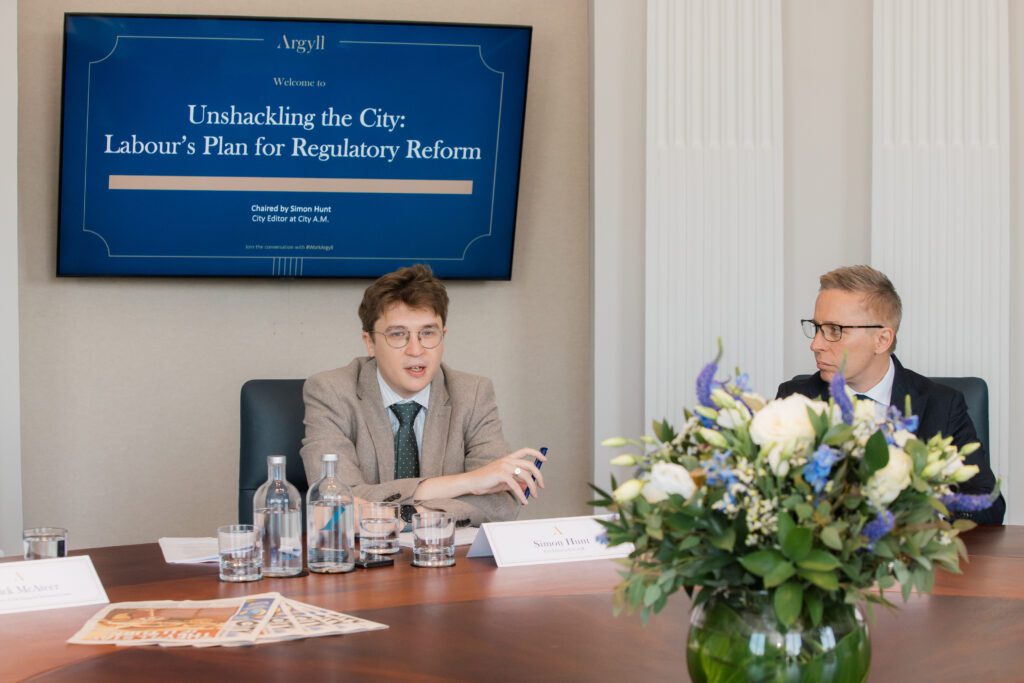For our latest Argyll event, we brought together leading financial services experts at our landmark 1 Cornhill property to discuss Labour’s plans for regulatory reform in the City. The lively discussion was held around the vast round table of our Dome Room, overlooking the Bank of England in the heart of the City of London.
The event was chaired by Simon Hunt, City Editor of City A.M., and the participants to the discussion included industry leaders and policy experts from a range of financial organisations, including:
- Fairer Finance
- TheCityUK
- The Financial Inclusion Centre
- Association of Investment Companies
- The Social Market Foundation
- Forvis Mazars
- Association of British Insurers
- Adam Smith Institute
- Europe Economics
Covering a range of different views and perspectives on Labour’s regulatory plans, the discussion was grounded in the regulatory context inherited from previous governments. How can the new Labour Government strike the right balance between business and consumer interests, innovation and regulation, risk mitigation and economic growth?
The regulatory backdrop
The discussion kicked off by covering the regulatory background the Labour Government found itself in when it was elected in 2024. Following increased regulatory scrutiny after the 2008 financial crisis, a raft of regulations to protect consumers was implemented to reduce the impact of a similar crisis in the future.
Balancing the perceived need for regulation to protect against financial mis-selling with the perceived need for economic growth has been one of the sticking points for regulators and industry experts since the crisis.
Various participants to the discussion argued that since the financial crisis, regulation had leant too far towards being a tool to mitigate risk, as opposed to being solely a mechanism to protect consumers. One participant pointed out that to achieve growth and competition, some amount of risk – and loss – is necessary. Meanwhile, others defended the virtues of post-2008 regulation, viewed as vital protection for consumers.

Balancing consumer and business interests
Opinions on Labour’s regulatory policies varied as the discussion progressed. Some welcomed the cut to regulations, pointing out that an over-regulated environment limits growth and new product development that could aid much-needed savings for the UK public. One participant celebrated cuts to regulation for regulation’s sake – ‘gold plating’, as they dubbed it, but warned against a wholesale bonfire of regulation.
Others argued that reduced regulation could increase the risk of a crash like the one that rocked the City in 2008, which had a devastating impact on the UK economy more broadly. Is introducing measures to manage the failure of large financial institutions a better way to mitigate against future financial crises?
The need for nuance, speed and follow-through
Despite differences of opinion on what Labour’s regulatory agenda should look like, there was a general agreement that regulatory reform requires a targeted approach informed by close collaboration between industry and regulators.
There was also broad agreement that regardless of the virtues of regulation, regulators must be better at enforcing their rules – and communicating with businesses, both on individual cases and on how to be compliant with regulations more generally. Participants identified the need for greater clarity and speed of communications from regulators to ensure businesses have clear and timely advice on the rules and regulations they need to follow.
Whilst questions remain as to exactly what Labour’s regulatory agenda should look like, many agreed that improved enforcement through better communication with businesses could well be the next step towards solving Labour’s regulatory puzzle.
Many thanks to the roundtable’s participants, including Theo Bertram, Eric Cloutier, James Daley, John Godfrey, Andrew Lilico, Maxwell Marlow, Mick McAteer, David Otudeko and Richard Stone. A special thanks to Simon Hunt for chairing the event.
If you are interested in hearing more about our 1 Cornhill building or other offices in our portfolio, do not hesitate to get in touch via 020 3008 8888.










